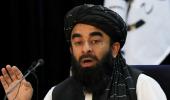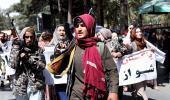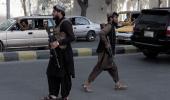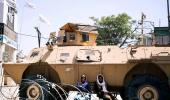Even though the Taliban managed to capture Afghanistan and form a government, an internal rift between the faction has started emerging, according to media reports.

Writing for The Spectator, David Loyn, said that Taliban co-founder Mullah Baradar had expected to run the government but was instead given a deputy's role. He wanted more roles for Afghanistan's many ethnic minorities in the government and has also argued that the green, red and black Afghan national flag should still be flown alongside the white Taliban flag.
"Tempers flared in a meeting in presidential palace in Kabul and spilled over into a fight between Baradar's supporters and those of Khalil Haqqani. Some accounts said there was gunfire, although this has not been verified," Loyn said.
Gunfire heard in Kabul earlier this month was actually a power struggle between two senior Taliban leaders -- group co-founder Mullah Abdul Ghani Baradar and Afghan Taliban leader, Anas Haqqani, according to some accounts.
The incident took place over an alleged disagreement among the Taliban leaders on how to resolve the Panjshir situation.
The information about reported gunfight was shared through the unverified Twitter handle of Panjshir Observer, which describes itself as an independent news outlet covering Afghanistan and Panjshir.
Following the fight, Baradar disappeared for some days, resurfacing in Kandahar, where the group's supreme leader Haibatullah Akhundzada is said to be based.
"While these very public disagreements have been played out, the whereabouts of the leader of the Taliban, Haibatullah Akhunzada, are not known. He has not been seen or heard from for some time, and there are many rumours that he is dead," Loyn said.
"This vacuum at the top has allowed for arguments between the Taliban factions to erupt in a way that they did not when the Taliban were last in power, and the word of the leader of the movement Mullah Omar was law, even though he never came to Kabul. The titular head of the government formed earlier this month, Mullah Hassan Akhund, does not hold real power," Loyn said, adding that "there is no one to rein in the Haqqani network, who are very much off-message in their public statements."
It is been over a month when the Taliban captured Kabul after an aggressive and rapid advance against Afghanistan government forces after US military drawdown.
The country plunged into crisis last month after Kabul fell to the Taliban and the democratically elected government of former president Ashraf Ghani collapsed.
Loyn stated that it is difficult to predict how Pakistan will manage their new power in Afghanistan.
Pakistan intelligence chief Lt Gen Faiz Hameed arrived in Kabul earlier this month leading a delegation of Pakistani officials. Hameed's emergency visit affirms that the Taliban are merely an Inter-Services Intelligence puppet.
Pakistan and its notorious intelligence agency have been accused of supporting the Taliban in taking over Afghanistan.
Experts believe that Pakistan has been a key player in removing the elected Afghan government from power and establishing the Taliban as a decisive power in Afghanistan. Recently, a UN Monitoring report has said that a significant part of the leadership of Al-Qaida resides in Afghanistan and Pakistan border region.
Former Afghan Vice-President Amrullah Saleh has asserted that the Taliban are being micromanaged by Pakistan's notorious intelligence agency -- the ISI, adding that Islamabad is in charge of the war-ravaged country effectively as a colonial power.











 © 2025
© 2025